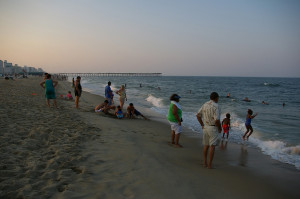Mid-Atlantic governors sign pact to protect ocean environment
MECHANICSVILLE, Va. — Last Thursday, just a weekend before the first official observance of World Oceans Day, the governors of Delaware, Maryland, New Jersey, New York, and Virginia signed an agreement committing the states to a cooperative effort to protect the ocean waters of the Mid-Atlantic.
The “Mid-Atlantic Governors’ Agreement on Ocean Conservation” establishes the Mid-Atlantic Regional Council of the Ocean — consisting of the five governors — which should improve coordination among the states and minimize state-line obstacles to effective action.
“Our coastal waters are a vital part of our history and economy,” Virginia Governor Tim Kaine said in a statement. “I am very pleased to be coordinating efforts and resources with our regional neighbors to increase the effectiveness and efficiency of our conservation efforts.”
The governors agreed that the council should — at least initially — concentrate on the following priorities: 1) regional coordination of the protection of important habitats and sensitive and unique offshore areas; 2) promotion of improvement in regional water quality as a focal point for action; 3) regional collaboration on sustainable development of offshore renewable energy sources; and 4) preparation of the region’s coastal communities for the effects of climate change.
“I think there’s a lot of potential for it to make a big difference,” said Jackie Savitz. “I say that because there’s so many things that need to happen with regard to the oceans. Since the oceans don’t have state boundaries, these are issues that the governors are all going to be having to work on together in some ways.”
Mid-Atlantic Ocean Links:
Mid-Atlantic Regional Council on the Ocean
Delaware Coastal Programs
Maryland Chesapeake and Coastal Program
New Jersey Coastal Management Program
New York Division of Coastal Resources
New York Ocean and Great Lakes Ecosystem Conservation Council
Virginia Chesapeake Bay Program
Virginia Coastal Program
Among the issues Savitz says the governors will have to cooperate on is that of climate change and the development of offshore energy resources.
“The question of whether we need to be drilling for additional oil and gas off the coast is one that all these governors will be grappling with,” Savitz said. “Whether we can generate energy with offshore wind is another one that all these governors are going to be grappling with. When you look at offshore wind, one of the best places to get in in the U.S. is off the Mid-Atlantic coast — nearly anywhere off the Atlantic Coast as opposed to the West coast or the Gulf.”
Aside from offshore energy development, Savitz said another key issue will be water quality.
“These are all states that that have a lot of similarities in terms of beaches,” said Savitz. “New York and New Jersey, especially, but Delaware, Maryland, and Virginia all have a big component of their economy dependent on tourism and beaches, so I can see them working on water quality-type issues.”
Within the next six months, the governors plan a summit — involving members of the academic, advocacy, and business communities — to plan and implement shared actions to be undertaken as part of the agreement. Beginning in the spring, the council will begin periodic reviews of its progress and make revisions to its plans as it deems necessary.
It is not yet known how this partnership will affect cooperative efforts on another common resource — the Chesapeake Bay — but Kaine, in his statement, linked the Bay’s health to that of other coastal ecosystems. Some of the council’s stated goals, such as reducing runoff pollution into the region’s waterways, will benefit the Chesapeake, Delaware Bay, and coastal Atlantic waters collectively.
Despite the threats facing the region’s marine environment, Savitz said that enthusiasm for the effort was high among the troops.
“I was at the conference … and they had a series of working sessions in addition to the press conference that they held. There were about 200 state resource agency staff there. In their working sessions, they were talking about what the issues would be, what kind of mechanisms they could use to work together and things like that,” Savitz said. “From what I heard from some of the staff, they were the kind of working sessions where everybody was really enthusiastic and they were going over time, running out of time. I think it is a positive step.”
— David M. Lawrence
Leave a Response
You must be logged in to post a comment.




You must be logged in to post a comment.